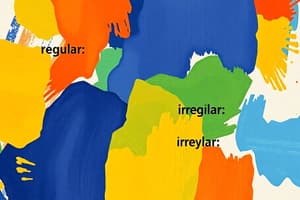Podcast
Questions and Answers
Match the following verb tenses with their corresponding regular verb endings:
Match the following verb tenses with their corresponding regular verb endings:
Present Simple = Base Form Past Simple = -ed Third Person Singular Present = -s Present Continuous = -ing
Match the following verb forms with their correct definitions:
Match the following verb forms with their correct definitions:
Gerund = -ing Infinitive = To + Base Form Participle I (-ing) = -ing Participle II (-ed) = -en
Match the verb 'walk' with its corresponding form in different tenses:
Match the verb 'walk' with its corresponding form in different tenses:
Present Simple = walk Past Simple = walked Third Person Singular Present = walks Present Continuous = walking
Match the following time expressions with the corresponding past tense verb form:
Match the following time expressions with the corresponding past tense verb form:
Match the following descriptions with the correct type of verb - regular or irregular:
Match the following descriptions with the correct type of verb - regular or irregular:
Match the following verbs with their type:
Match the following verbs with their type:
Match the following verbs with their past simple form:
Match the following verbs with their past simple form:
Match the following verbs with their past continuous form:
Match the following verbs with their past continuous form:
Match the following verbs with their irregular base form:
Match the following verbs with their irregular base form:
Match the following time expressions with their corresponding verb tense:
Match the following time expressions with their corresponding verb tense:
Flashcards are hidden until you start studying
Study Notes
Verb Conjugation
Verb conjugation is the process of changing the form of a verb to agree with its subject in person, number, tense, mood, voice, aspect, and degree. In most languages, including English, there are two main types of verbs: regular verbs and irregular verbs. Let's take a closer look at these categories and their unique characteristics.
Regular Verbs
Regular verbs change their forms by adding an ending to the base word of the verb. For example, the present participle of 'walk' is formed simply by adding '-ing', so it becomes 'walking'. Other endings used with regular verbs to indicate tenses include -ed (past simple), -es (third person singular present) and -er (present continuous). Here's an overview of some common verb endings found in regular verbs:
- Present Simple: Base Form
- Past Simple: -ed
- Third Person Singular Present: -s
- Present Continuous: -ing
- Gerund: -ing
- Infinitive: To + Base Form
- Participle I (-ing): -ing
- Participle II (-ed): -en
The rules for forming regular verbs are relatively straightforward, making them easier to conjugate than irregular verbs. However, even though they follow standard patterns, some exceptions do exist due to historical reasons, such as certain suffixes being added to the end of a word, altering how we pronounce and spell specific verbs.
Irregular Verbs
Irregular verbs break away from the conventional pattern followed by other verbs when conjugating. They have different bases, inflections, and sometimes completely different stems depending on which tense you're using. As a result, learning to properly conjugate irregular verbs can require more attention because they don't always follow predictable patterns like regular verbs do. Some examples of irregular verbs include go, eat, drink, see, and hear. While these may seem simple compared to many others, understanding why they deviate from regular patterns is key to mastering the intricate world of verb conjugations.
Time Expressions in Past
When dealing with the past, both regular and irregular verbs work similarly. For instance, the past simple tense of any verb is created by adding '-d' or '-ed' to the root word, while the past continuous tense uses '-ing' after the auxiliary verb was or had been. So whether your verb follows the typical pattern or breaks the mold, it will still show up in the past just as expected. For example, if we want to say she walked yesterday morning, we would use the past simple tense (base form + -d/-ed) resulting in "She walked." If instead we wanted to convey that she continued walking throughout the morning, we might choose the past continuous tense "-ed + -ing," producing "She was walking."
In summary, grasping the concept of verb conjugation means not only knowing the basic rules for altering verbs based on tense, person, and other factors, but also understanding how those rules apply specifically to each type of verb. With practice and patience, anyone can become adept at navigating through this grammatical landscape!
Studying That Suits You
Use AI to generate personalized quizzes and flashcards to suit your learning preferences.




